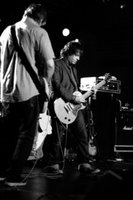Post-rock was the dominant form of experimental rock during the '90s, a loose
 movement that drew from greatly varied influences and nearly always combined standard rock instrumentation with electronics. Post-rock brought together a host of mostly experimental genres -- Kraut-rock, ambient, prog-rock, space rock, math rock, tape music, minimalist classical, British IDM, jazz (both avant-garde and cool), and dub reggae, to name the most prevalent -- with results that were largely based in rock, but didn't rock per se. Post-rock was hypnotic and often droning (especially the guitar-oriented bands), and the brighter-sounding groups were still cool and cerebral -- overall, the antithesis of rock's visceral power. In fact, post-rock was something of a reaction against rock, particularly the mainstream's co-opting of alternative rock; much post-rock was united by a sense that rock & roll had lost its capacity for real rebellion, that it would never break away from tired formulas or empty, macho posturing. Thus, post-rock rejected (or subverted) any elements it associated with rock tradition. It was far more concerned with pure sound and texture than melodic hooks or song structure; it was also usually instrumental, and if it did employ vocals, they were often incidental to the overall effect. The musical foundation for post-rock crystallized in 1991, with the release of two very different landmarks: Talk Talk's Laughing Stock and Slint's Spiderland. Laughing Stock was the culmination of Talk Talk's move away from synth-pop toward a moody, delicate fusion of ambient, jazz, and minimalist chamber music; Spiderland, meanwhile, was full of deliberate, bass-driven grooves, mumbled poetry, oblique structures, and extreme volume shifts. While those two albums would influence many future post-rock bands, the term itself didn't appear until critic Simon Reynolds coined it as a way to describe the Talk Talk-inspired ambient experiments of Bark Psychosis. The term was later applied to everything from unclassifiable iconoclasts (Gastr del Sol, Cul de Sac, Main) to more tuneful indie-rock experimenters like Stereolab, Laika, and the Sea and Cake (not to mention a raft of Slint imitators). Post-rock came into its own as a recognizable trend with the Chicago band Tortoise's second album, 1996's Millions Now Living Will Never Die, perhaps the farthest-reaching fusion of post-rock's myriad touchstones. Suddenly there was a way for critics to classify artists as diverse as Labradford, Trans Am, Ui, Flying Saucer Attack, Mogwai, Jim O'Rourke, and
movement that drew from greatly varied influences and nearly always combined standard rock instrumentation with electronics. Post-rock brought together a host of mostly experimental genres -- Kraut-rock, ambient, prog-rock, space rock, math rock, tape music, minimalist classical, British IDM, jazz (both avant-garde and cool), and dub reggae, to name the most prevalent -- with results that were largely based in rock, but didn't rock per se. Post-rock was hypnotic and often droning (especially the guitar-oriented bands), and the brighter-sounding groups were still cool and cerebral -- overall, the antithesis of rock's visceral power. In fact, post-rock was something of a reaction against rock, particularly the mainstream's co-opting of alternative rock; much post-rock was united by a sense that rock & roll had lost its capacity for real rebellion, that it would never break away from tired formulas or empty, macho posturing. Thus, post-rock rejected (or subverted) any elements it associated with rock tradition. It was far more concerned with pure sound and texture than melodic hooks or song structure; it was also usually instrumental, and if it did employ vocals, they were often incidental to the overall effect. The musical foundation for post-rock crystallized in 1991, with the release of two very different landmarks: Talk Talk's Laughing Stock and Slint's Spiderland. Laughing Stock was the culmination of Talk Talk's move away from synth-pop toward a moody, delicate fusion of ambient, jazz, and minimalist chamber music; Spiderland, meanwhile, was full of deliberate, bass-driven grooves, mumbled poetry, oblique structures, and extreme volume shifts. While those two albums would influence many future post-rock bands, the term itself didn't appear until critic Simon Reynolds coined it as a way to describe the Talk Talk-inspired ambient experiments of Bark Psychosis. The term was later applied to everything from unclassifiable iconoclasts (Gastr del Sol, Cul de Sac, Main) to more tuneful indie-rock experimenters like Stereolab, Laika, and the Sea and Cake (not to mention a raft of Slint imitators). Post-rock came into its own as a recognizable trend with the Chicago band Tortoise's second album, 1996's Millions Now Living Will Never Die, perhaps the farthest-reaching fusion of post-rock's myriad touchstones. Suddenly there was a way for critics to classify artists as diverse as Labradford, Trans Am, Ui, Flying Saucer Attack, Mogwai, Jim O'Rourke, and their predecessors (though most hated the label). Post-rock quickly became an accepted, challenging cousin of indie rock, centered around the Thrill Jockey, Kranky, Drag City, and Too Pure labels. Ironically, by the end of the decade, post-rock had itself acquired a reputation for sameness; some found the style's dispassionate intellectuality boring, while others felt that its formerly radical fusions had become predictable, partly because many artists were offering only slight variations on their original ideas. However, even as the backlash set in, a newer wave of bands (the Dirty Three, Rachel's, Godspeed You Black Emperor!, Sigur Rós) gained wider recognition for their distinctive sounds, suggesting that the style wasn't exhausted after
their predecessors (though most hated the label). Post-rock quickly became an accepted, challenging cousin of indie rock, centered around the Thrill Jockey, Kranky, Drag City, and Too Pure labels. Ironically, by the end of the decade, post-rock had itself acquired a reputation for sameness; some found the style's dispassionate intellectuality boring, while others felt that its formerly radical fusions had become predictable, partly because many artists were offering only slight variations on their original ideas. However, even as the backlash set in, a newer wave of bands (the Dirty Three, Rachel's, Godspeed You Black Emperor!, Sigur Rós) gained wider recognition for their distinctive sounds, suggesting that the style wasn't exhausted after











0 COMMENTS:
Post a Comment